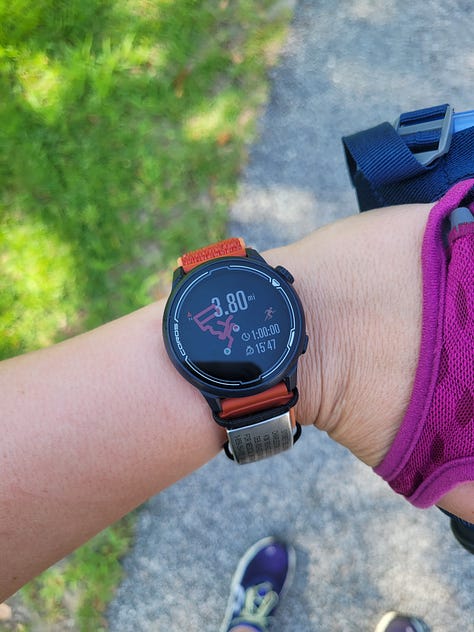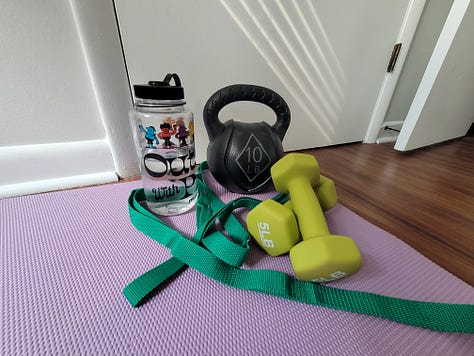I’m Becoming a Better Runner. Find Out Why.
Much to my own disappointment, speed workouts and strength training do make me a better runner. Who would’ve thought?
If you read this every week and feel yourself inspired to chase after your goals, why not subscribe?



For a little over a month, I’ve been working with my coach, Dana Henderson, to rebuild my base fitness ahead of the official start of half marathon training in July. I had forgotten how much I loved running and moving my body nearly every day. Establishing a regular running routine has added some structure back to my days and, in the past six weeks, my confidence as a runner has increased.
Increased interval training to improve speed and endurance
One of the major differences between this training cycle and training for the marathon is my training “method.” For the marathon, I followed a modified version of the Galloway plan. Traditionally, the Galloway method calls for two 30-minute runs during the week followed by a weekend long run. I wanted to challenge myself this training cycle and Dana suggested following an 80/20 plan.
In 80/20 training, 80% of runs are done at a low intensity and 20% are done at a high intensity. With this new method, I’ve had the opportunity to challenge myself in a few interval workouts throughout the week. I used to abhor speed workouts—getting outside to do them was drudgery—but I’ve found I enjoy playing with speed. These types of workouts offer a new dimension to running and break up the monotony of just doing easy runs.
Week after week, I’m reaching and maintaining speeds I didn’t think were possible. Sometimes I’m able to hold these faster paces for at least 10 minutes, which, outside of a race, I didn’t realize I could do.
With running, there is always room for improvement. I come back to Sabrina B. Little’s concept of the trick escalator: whenever we reach one goal, we move the goal posts and strive for something even more. I’m trying to balance my own performance goals with just enjoying the opportunity to run. The fact that I can do this—that I am doing this—is something I could not have imagined even two years ago.
Building strength and mobility to be a better runner
I’ve never liked strength training, even though I know I should do it. Since the beginning of the year, I have attempted and failed to maintain a regular strength training regimen, despite Kimberly’s encouragement and healthy dose of much-needed shaming. Strength training is extra important, because I know have several strength and mobility deficiencies that need to be addressed:
Ankle mobility. I sprained my left ankle during grad school and skimped on physical therapy, leaving it weak and with limited mobility. I have hardly any external rotation and still roll it… a lot.
Glute weaknesses. In spring 2024, I was dealing with knee pain while running. After visiting the orthopedic office, I discovered that my knee pain had its roots in weak glutes. I went to PT for a few months, but fell off my strength training.
Core strength. Everyone needs more core strength, especially runners.
When I started with Dana in mid-May, I asked her to incorporate strength workouts into my training. Now, I have strength workouts twice a week, which feels reasonable and I know I can do it. While I still don’t enjoy it all that much, I know that it has and will continue to help. I do think part of the reason I’ve been more consistent with strength training in the past month has to do with the extrinsic motivation of having a coach. Sometimes it’s much easier to do stuff when someone else tells you to!
Additionally, because of all of the research and thinking I’ve done about menopause in the past couple of weeks, I know strength training is imperative to maintaining muscle mass and bone density. Looking into it and thinking about how menopause has affected my day-to-day life — and how it affects my athletic performance — has really driven home the long-time importance of keeping myself strong.
Even in the few weeks I’ve been running, I have felt a difference in my body. I feel stronger and more capable. I can run longer distances without needing a walking interval to slow my heart rate.
In a conversation with Dana, she told me that she can see the improvements I’m making and how strength training has made a difference in my ability. I hate it when other people are right, but I guess I will continue with strength training. It helps. It really does.
What do your workouts look like? What have you been training for?






Strength training is super important. I love feeling strong and you are right, we benefit fromnthem and become better runners